Meet a few Iowans who are leading the charge against food insecurity with creative new solutions or, in some cases, tried-and-true strategies with a new twist. They will be speaking at the upcoming Iowa Stops Hunger event – register here.

Zuli Garcia
Executive Director, Knock and Drop Iowa
The Work
Every Wednesday afternoon, hundreds of Central Iowans in need line up for free pantry staples at the old Franklin Junior High School on the north side of Des Moines. They chat with Spanish-speaking volunteers and gather rice, beans, tortillas, pastries, fruits, veggies and other familiar foods, all in a safe space where nobody asks for any government IDs or official documents.
Knock and Drop Iowa is the state’s only food pantry set up specifically for Latinos, and it’s expanding its reach beyond the capital, sending volunteers to deliver food at halfway points to St. Charles, Marshalltown and Ottumwa.
They’re also teaming up with other groups to develop culturally relevant services for Afghan refugees and other relative newcomers. “When you’re struggling,” Garcia said, “it goes a long way when you have something good to eat.”
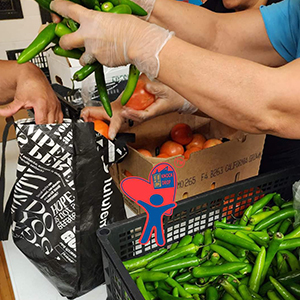 The Back Story
The Back Story
When the pandemic hit, Garcia heard through her job at the Des Moines Police Department about a number of Latino families who were struggling to make ends meet. She heard stories about kids eating cereal with water instead of milk, and parents stretching paychecks from one month to the next.
She had assumed there were services to take care of them. But when she realized the scope of the problem, she rallied a few friends and friends-of-friends to “knock” on doors and “drop” food on the doorstep, leaving quickly to avoid COVID-19.
Word spread. Others stepped up to help. They formed a nonprofit.
Garcia was born in El Salvador and grew up in California, where her dad is retired and lives on a fixed income. He occasionally receives donated food from a local pantry but isn’t a fan of the bland canned food it usually stocks. He recently told his daughter, “I’d love to live in Iowa where you give out all that amazing food that we eat.”
The Key to Success
Even in its first couple of years, Knock and Drop Iowa has received significant support from local businesses and more established organizations around town. They’re working with the Food Bank of Iowa to supply more corn flour and with Capital City Fruit to gather more produce, like hot peppers, which usually don’t show up in traditional pantries. Trader Joe’s donated surplus flowers to distribute for Mother’s Day.
The group has also received grants from Refugee and Immigrant Voices in Action (RIVA) and Polk County Early Childhood Iowa to expand services beyond food distribution. They’ve helped organize vaccine clinics, for example, and clothing drives for the winter.
“This isn’t your traditional food pantry,” Garcia said. “What else can we provide?”

John Kline
Pastor, Zion Lutheran Church
The Work
Like other religious groups around town, Zion Lutheran Church on Beaver Avenue serves local immigrants and refugees in lots of practical ways. They donate clothing and furniture, help with job applications, tutor students and shuttle them to and from school.
But after Kline became the head pastor, in 2005, the church offered something more: a free meal before almost every activity. He often says, “People shouldn’t have to tell us if they’re hungry. We’ll always feed them first.”
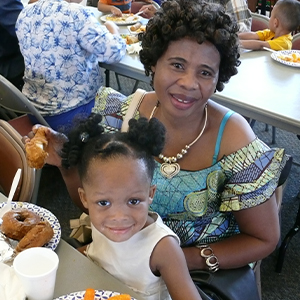 That philosophy, rooted in scripture, has inspired the church’s efforts to fill backpacks with food for neighborhood school kids, to collect and distribute bread, to serve meals before church activities on Sunday mornings and Wednesday nights, and to deliver meals once a month to folks who live in tents along the river. Once a week, the pastor feeds about a dozen-some “marauding teenagers” who meet at his home and often raid the freezer for ice cream.
That philosophy, rooted in scripture, has inspired the church’s efforts to fill backpacks with food for neighborhood school kids, to collect and distribute bread, to serve meals before church activities on Sunday mornings and Wednesday nights, and to deliver meals once a month to folks who live in tents along the river. Once a week, the pastor feeds about a dozen-some “marauding teenagers” who meet at his home and often raid the freezer for ice cream.
The Back Story
Around 2010, “we had been asking God for direction, and he gave it,” Kline said. “Before that, all of our efforts to grow the church were about getting more people like us, so we could do what we wanted to do, which didn’t seem very ‘Jesus’ when you really took it apart.”
He cited the example of selfless service that Jesus set by washing people’s feet. But the pastor confessed, “For us, cooking comes a lot more naturally.”
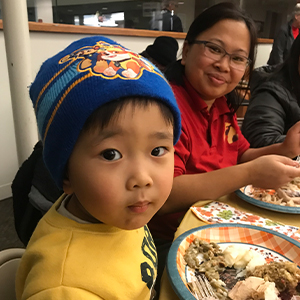 During one outreach project, the congregation took fried chicken and a band to the Douglas Terrace Apartments. “I think everybody was a little afraid of us at first,” Kline said., “But the kids responded very well to the food, so we went back every month.”
During one outreach project, the congregation took fried chicken and a band to the Douglas Terrace Apartments. “I think everybody was a little afraid of us at first,” Kline said., “But the kids responded very well to the food, so we went back every month.”
The Key to Success
After the church set out to fulfill basic needs first, all kinds of opportunities followed. Their projects have changed over the years to suit the neighborhood’s needs, but the congregation can still whip up a meal for the multitudes. “God provided us with people who like to do that, to cook and serve and clean up,” the pastor said. “That part runs like a well-oiled machine.”
Besides, he added, “Eating together is a very biblical thing. It builds community.”
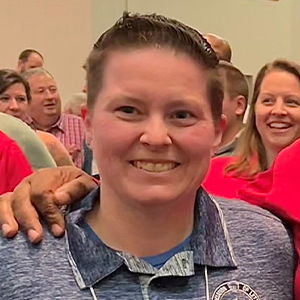
Michelle Paulsen
Letter Carrier, U.S. Postal Service
The Work
Paulsen is the local coordinator for a national food drive called Stamp Out Hunger. It’s a joint effort of the U.S. Postal Service and the National Association of Letter Carriers, whose union members collect donated food during their daily rounds, including about 40,000 food items each year in Central Iowa. The national campaign on the second Saturday in May is the largest single-day food drive in the country.
The Back Story
“I was a kid who struggled to have enough to eat,” said Paulsen, who grew up in Council Bluffs. She signed up to help with Stamp Out Hunger shortly after she joined the postal service in 2016 and has led the local campaign since 2017.
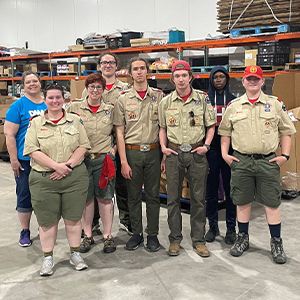 The Key to Success
The Key to Success
Paulsen delivers mail in Clive and is a member of the carrier union’s local branch, 352, which covers Des Moines, Ankeny, Marshalltown and Winterset. The food they collect replenishes local food pantries in each of those communities.
Over the years, Paulsen has enlisted help from both Hy-Vee and Fareway, which donate bags the mail carriers distribute on their rounds to remind people to pitch in. She is also a scoutmaster with the Cub Scouts and Boy Scouts and has successfully encouraged troops to collect donations outside grocery stores. One year, she said, they spread out to four Hy-Vee stores and “collected a thousand pounds of food, just sitting outside for a few hours.”
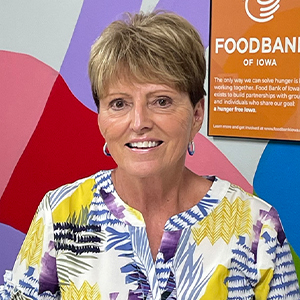
Gwen Simpson
Executive Director, Lamoni Food Pantry
The Work
Simpson coordinates more than 60 volunteers who staff and stock the pantry that serves Lamoni, Davis City and Decatur County. In addition to providing food, the pantry offers free holiday meals, free food-filled backpacks for school kids, emergency relief funds, and “step up” grants to low-income families and individuals. Volunteers also deliver food to people who can’t get out and about.
The Back Story
Simpson joined the cause a dozen years ago, when the whole operation fit inside just three little cupboards at the Methodist church. It was stocked with whatever canned goods folks remembered to grab from home on Sunday mornings. It was pretty slim pickin’s.
“You know what? I hate beets,” Simpson said, putting herself in the shoes of the pantry’s visitors. “So don’t give me a can of beets and expect me to be grateful for it.”
Simpson is minister with the Community of Christ and had recently retired from a job with hospice when the congregation nudged her to redirect her energy and skills toward the food pantry. “I’m a planner and an organizer,” she said, “but anyone who reaches out in faith can be a change agent.”
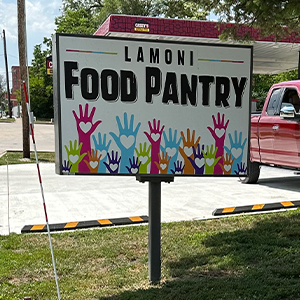 The Key to Success
The Key to Success
Simpson worked with volunteers from several local churches to coordinate resources and volunteers. She also reached out to the Food Bank of Iowa to secure a more reliable supply of food, which enabled the pantry to offer regular hours. Now folks can just pop in, instead of asking a pastor for a hand-out.
The project got a big boost when it outgrew its church home and moved to its own location. After scouting more than two dozen places around town, Simpson asked a local real estate agent to keep on the lookout for potential properties. As it turned out, the agent had just received a tip that a former insurance office would be available, right in the middle of town.
“It was a God job that we got this building,” Simpson said. The pantry team raised more than $250,000 to buy and renovate the property, build a parking lot, and stash away funds for ongoing maintenance.
Simpson said it’s important to articulate the community’s needs and suggest specific ways that people can help. She also encourages volunteers to involve their kids so they can practice community service. That’s why the Lamoni Food Pantry has a youth council, whose members brainstorm additional ways they can help.
“I want this to be a seed planter,” she said. “Our sign out front has hands in all different colors and sizes. It’s about everybody.”











